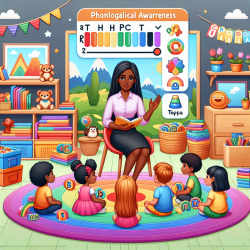The journey of acquiring reading skills begins long before a child opens their first book. Among the foundational elements for literacy is phonological awareness—the ability to recognize and manipulate sounds in spoken language. This skill is pivotal for early reading and spelling development. As educators and speech-language pathologists (SLPs) seek effective tools for assessing and enhancing phonological awareness, "The Test of Phonological Awareness" (TOPA) offers valuable insights and potential benefits. This critical review explores the utility and limitations of TOPA, aiming to guide practitioners in improving their skills and encouraging further research.
Understanding Phonological Awareness
Phonological awareness is a critical component of metalinguistic awareness, enabling individuals to reflect on and manipulate the phonological structures of language. Research consistently demonstrates a strong relationship between phonological awareness and early reading development. Explicit awareness of phonological structures, such as the ability to segment words into phonemes, significantly correlates with reading proficiency. Training in phonological awareness can have lasting effects on reading and spelling skills, highlighting the importance of early assessment and intervention.
The Role of TOPA in Assessing Phonological Awareness
The Test of Phonological Awareness (TOPA), developed by Torgesen and Bryant (1994), is designed to assess young children's ability to isolate phonemes in orally presented words. Available in Kindergarten and Early Elementary versions, TOPA aims to identify children who may benefit from targeted phonological awareness instruction. By assessing specific lower-level phonological skills, TOPA serves as a potential tool for screening and planning interventions.
Strengths and Limitations of TOPA
TOPA's strengths lie in its focus on a critical aspect of early literacy development and its utility as a group screening tool. However, its limitations must be acknowledged to effectively use the test within an educational or therapeutic context. One significant limitation is the test's focus on lower-level phonological skills, which may not fully capture a child's phonological awareness capabilities. Additionally, the test does not allow for assessment of children younger than Kindergarten age, potentially missing an opportunity for early identification and intervention.
Implications for Practice
For practitioners, the critical review of TOPA underscores the need for a comprehensive approach to assessing phonological awareness. While TOPA can be a valuable part of a battery of tests, it should not be the sole determinant of eligibility for intervention. Practitioners are encouraged to complement TOPA with other assessments to build a more complete profile of a child's phonological skills and literacy potential.
Advancing Phonological Awareness Research and Practice
The review also highlights the ongoing need for research into the nature of phonological awareness and its development. Further studies are essential to refine our understanding of how phonological awareness evolves and its impact on literacy outcomes. Such research can inform the development of more effective assessment tools and intervention strategies, ultimately enhancing early reading instruction and support.
Conclusion
"The Test of Phonological Awareness: A Critical Review" provides valuable insights into the assessment of phonological awareness and its implications for early reading development. By critically examining TOPA's strengths and limitations, practitioners can better navigate the complexities of literacy support. As we continue to explore the intricacies of phonological awareness, our collective efforts can lead to more effective strategies for fostering literacy skills in young learners.
For educators and speech-language pathologists seeking to deepen their understanding of phonological awareness assessment and intervention, this review offers a comprehensive analysis of TOPA's utility and limitations. Embracing a holistic approach to assessment and staying informed about the latest research are crucial steps in supporting early literacy development.
To read the original research paper, please follow this link: The Test of Phonological Awareness: A Critical Review.










